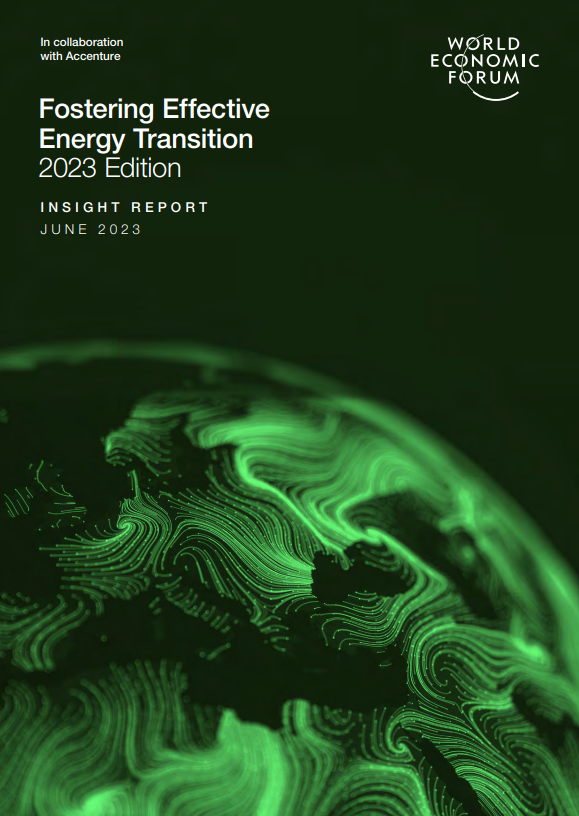Fostering Effective Energy Transition 2023 discusses the global energy transition, its associated challenges, and opportunities for different countries. This transition balances energy systems’ equity, security, and sustainability. In particular, a data framework, the Energy Transition Index (ETI), is used to measure and compare the performance and readiness of energy systems across 120 countries.
It shows that progress in energy transition has been inconsistent globally, indicating a need for faster progression to limit climate change. Also, it identifies critical factors driving this progress, including policies, investments, innovation, and overall transition momentum.
The energy transition is a complex process that varies among nations and regions. It encompasses three critical dimensions – equity, security, and sustainability. Currently, progress across these dimensions is uneven. The security aspect has witnessed significant advancement, but it has compromised equity. The ongoing energy crisis and rising energy prices further amplify this disparity.
Key Insights
In collaboration with Accenture, the “Fostering Effective Energy Transition 2023” report provides insights into the global energy transition and its progress. Key findings and highlights from the report include:
- Plateaued progress: The global energy transition has slowed after a decade due to the worldwide energy crisis and geopolitical volatilities.
- Net-zero emissions: Eight countries have reached net-zero emissions, with various policies and initiatives in place to drive further progress, such as the US Inflation Reduction Act, EU Net-Zero Industry Act, EU Fit for 55 packages, Japan Green Transformation program, and the First Movers Coalition.
- Low-carbon energy technology investment: Global investment in low-carbon energy technology surged to $1 trillion, with the largest share directed towards renewables and electrified transport.
- Energy transition index: This new index highlights countries’ comparative strengths and improvement areas, allowing private stakeholders to compare countries’ relative system performance.
- Effective energy transition: The report emphasizes the need for an effective energy transition that simultaneously addresses economic development, universal access to secure and reliable supply, and environmental sustainability.
The Global Energy Transition: A Plateau
Still, the report paints a concerning picture of the global energy transition, highlighting a stagnation in progress after a decade of advancements. This plateau is attributed to several factors, including:
- Global Energy Crisis: The ongoing energy crisis has increased reliance on fossil fuels, particularly coal, due to supply chain disruptions and price volatility. This has hampered investments in clean energy technologies.
- Geopolitical Volatilities: Geopolitical events, such as the Russia-Ukraine war, have further destabilized the energy landscape, creating uncertainty and hindering long-term planning for clean energy projects.
In other words, it emphasizes that the global energy transition has slowed in recent years due to the worldwide energy crisis and geopolitical volatility. Despite this, it identifies several key developments:
-
- Eight countries have achieved net-zero emissions, and various policies and initiatives, such as the US Inflation Reduction Act, EU Net-Zero Industry Act, EU Fit for 55 packages, Japan Green Transformation program, and the First Movers Coalition, are driving further progress.
- Global investment in low-carbon energy technology has surged to $1 trillion, with the largest share directed towards renewables and electrified transport.
Critical Roles: Policies and Partnerships
Thus, the report emphasizes the vital roles of policies and partnerships in shaping a balanced and successful energy transition. Effective policies can:
- Create incentives for clean energy investments, including carbon pricing mechanisms, green finance initiatives, and renewable energy subsidies.
- Promote energy efficiency: Policies that encourage energy conservation and reduce demand for fossil fuels can significantly contribute to the transition.
- Facilitate grid modernization: Investments in smart grids and distributed energy systems are crucial for integrating and managing diverse renewable energy sources.
For instance, strong partnerships between governments, businesses, and civil society are essential for mobilizing capital and expertise to drive the energy transition forward. These partnerships can:
- Develop and deploy innovative clean energy technologies: Collaborative efforts can accelerate research, development, and commercialization of clean energy solutions.
- Share best practices and knowledge: Collaboration between countries and regions can help accelerate the learning curve and overcome common challenges.
- Ensure a just transition: Partnerships can support workers and communities most affected by the shift away from fossil fuels.
Benchmarking Progress: The Energy Transition Index (ETI)
Notably, the report introduces the ETI, a comprehensive tool that benchmarks 120 countries on their current energy system performance and the readiness of their enabling environment for the transition. This tool highlights countries’ comparative strengths and improvement areas, allowing private stakeholders to compare countries’ relative system performance. The ETI assesses countries across four key dimensions:
- Energy Security: This dimension analyzes the diversity and reliability of energy sources.
- Energy Accessibility: This dimension focuses on all citizens’ access to modern energy services.
- Environmental Sustainability: This dimension evaluates the ecological impact of the energy system, including greenhouse gas emissions.
- Economic Growth: This dimension assesses the impact of the energy system on economic development and job creation.
The ETI reveals significant disparities between nations. While some countries, like Sweden and Denmark, are making substantial strides towards clean energy, others, particularly those reliant on fossil fuel exports, are lagging.
Recommendations for Action:
It offers a set of actionable recommendations for governments, businesses, and other stakeholders to accelerate the energy transition:
- Increase investments in clean energy technologies and infrastructure: This includes renewable energy sources, energy storage solutions, and smart grid technologies.
- Foster public-private partnerships: Collaboration between governments and businesses can leverage resources and expertise to overcome investment barriers.
- Create a stable and predictable regulatory environment: Clear and consistent policies are crucial for attracting long-term investments in clean energy.
- Prioritize innovation: Continued research and development are necessary to reduce the costs of clean energy technologies and improve their performance.
- Ensure a just transition: Policies and programs are needed to support workers and communities affected by the change, including retraining programs and social safety nets.
Conclusion:
Ultimately, Fostering Effective Energy Transition 2023 report serves as a wake-up call and roadmap for action. Although the global energy transition faces significant challenges, the report provides a path forward. Hence, implementing the recommendations outlined in the report can accelerate progress towards a cleaner, more sustainable energy future.
In this sense, the report calls for urgent action towards the transition, emphasizing the importance of enhancing an equitable transition and building resilience to maintain progress throughout ongoing and future challenges. To facilitate effective dialogue between stakeholders, the report provides a data-driven framework to measure and understand the performance of energy systems and readiness for energy transition across countries.




